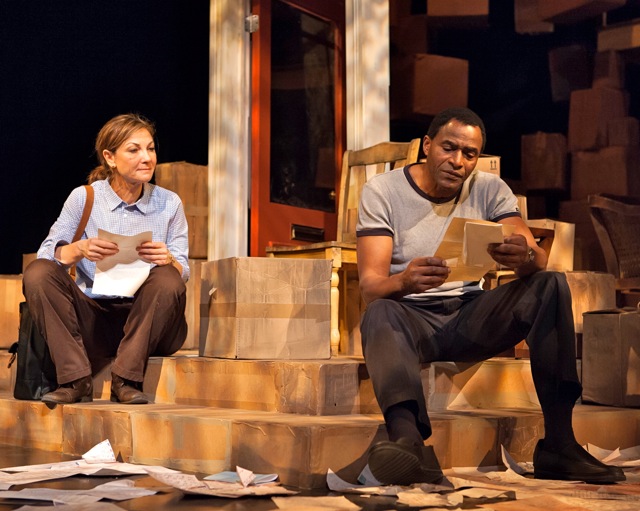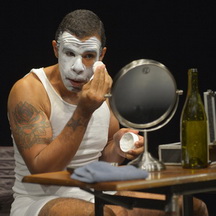A unexpected family reunites at SF Playhouse
Julie Hebert’s Tree, now at San Francisco Playhouse, plays out in the present, but the past seeps into every moment of it, like a tide, advancing inexorably. One of the play’s intertwined quartet of characters seeks to run from the creeping waters, one longs to plunge into them, one twists helplessly in their undertow, while one watches the others with the bemused cool of a young woman who stands safe on the sands–or thinks she does.
The ways the past rocks the present is one of the enduring themes of drama, from Oedipus to A Doll’s House, and Tree, small-scale but absorbing, contributes an urgency, a wit and a delicacy all its own to the tradition.
The “tree” of Hebert’s play is a family tree with surprising branchings. The tale begins on the front porch of a Chicago home. A white woman knocks. Her name is Didi Marcantel, and she’s a reporter for the New Orleans Times-Picayune, she tells Leo Price, the tall African-American man who opens the door. He’s diffident, even suspicious of her, and he has reason to be. She’s lying about being a reporter, it turns out. Not that she hasn’t come for a story, but it’s her story and Leo’s.
Unknown to him, and only recently discovered by her, they’re sister and brother.
How did it happen? The explanation arrives soon: same father, different mothers. The connection between that father and Leo’s mother, Jessalyn, who spends most of her days upstairs in the throes of dementia, was severed long ago, but the truth about how the split happened, uncovered during the course of the play, startles both Didi and Leo, who learn a surprising truth about illegitimacy.
Family is another recurrent theme of drama, and Tree is about that, too. Didi has traveled from Baton Rouge to “have a relationship,” as she puts it, with her newly discovered relatives, but Leo doesn’t want one with her, and their struggle to come to terms with one another is at the heart of the drama.
You can’t have an honest relationship unless you let the past have its say.
SF Playhouse does a fine job with the play. Jon Tracy directs with a sturdy tact, nicely abetted by Michael Oesch (lighting) Theodore J.H. Hulsker (sound) and Abra Berman (costumes). My only quibble is with Nina Ball’s jumbled set. It’s clearly meant to reflect themes, but it’s too literal-minded, and it gets in the way of the performers, who have to pick their way around its debris.
The actors are very fine, from Carl Lumbly’s quietly fierce Leo Price, to Cathleen Riddley’s chanting, swaying life force of an aging mother, Jessalyn, to Tristan Cunningham’s smart daughter, JJ, who wends her way with remarkable agility around the conflicted adults. Susi Damilano gives one of her best performances as the urgent Didi Marcantel, who sticks her face in the Price’s lives because those lives are in important ways entwined with hers. Damilano’s flawless Louisiana accent adds charm to her performance and to the action.
Tree plays on Post Street until March 7th, followed by Aaron Posner’s irreverent take on Chekhov’s The Sea Gull, called Stupid F**king Bird. For tickets/information call 415-677-9596 or visit www.sfplayhouse.org.
–ROBERT HALL
